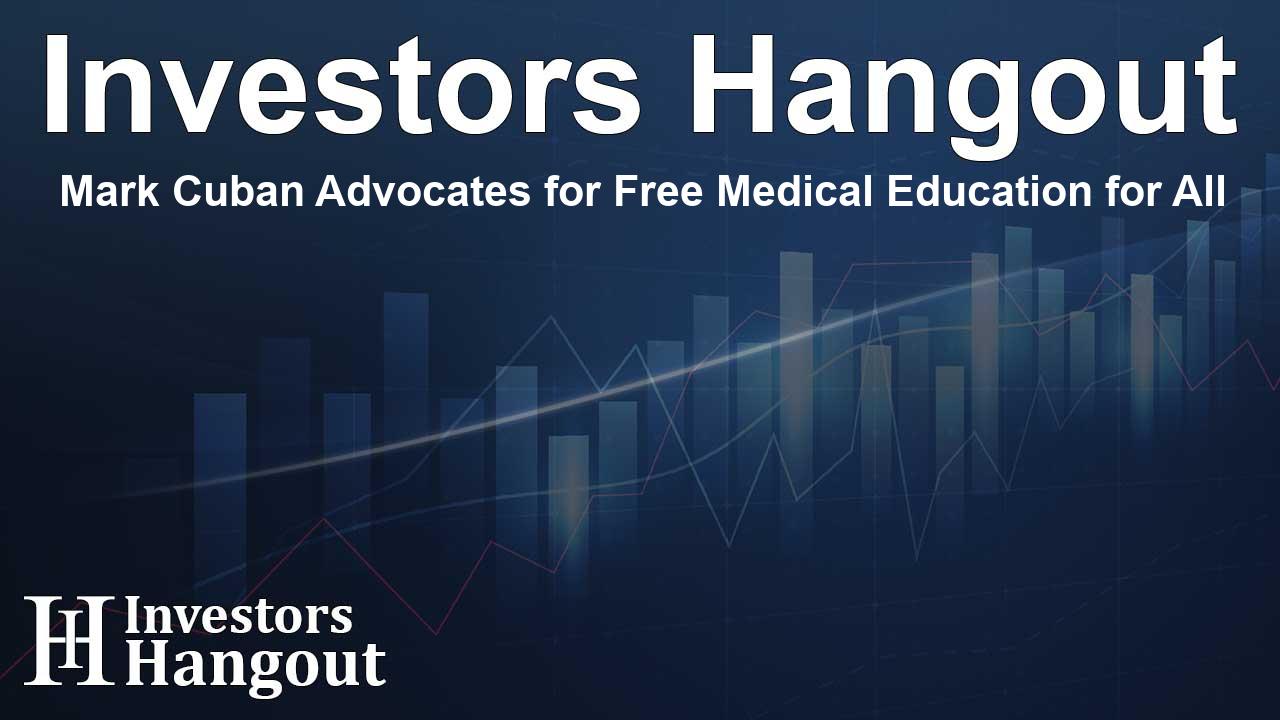Mark Cuban Advocates for Free Medical Education for All

Mark Cuban's Vision for Medical Education
Billionaire Mark Cuban has a vision that many believe could revolutionize medical education in the U.S. He strongly argues that medical school should be tuition-free, presenting a bold proposal that could benefit both students and the wider healthcare system. Cuban believes that if the government were to invest $10 billion annually, medical education could become accessible to everyone, thus ensuring that financial barriers do not restrict talented individuals from pursuing careers in medicine.
A Case for Affordable Training
Cuban points out that there are about 100,000 students currently enrolled in medical schools each year, with room and board representing a significant financial burden—approximately $100,000 annually. By advocating for free education, he expresses hope that aspiring doctors won’t be deterred by crippling student debt. He asserts that alleviating these financial concerns could spur enthusiasm for the medical profession, foster diverse career paths, and ultimately lead to a more robust healthcare system.
Addressing Career Decisions
The billionaire emphasizes that the current financial strain compels many students to make career choices based on economic considerations rather than pure passion for medicine. This scenario can lead to a doctor shortage, especially affecting underserved regions where access to care is already limited. Cuban insists that this fundamental change could lead to a system where quality healthcare becomes a reality for all Americans, not merely a privilege for the wealthy.
Historic Donations Signify Change
This isn't just an abstract idea for Cuban; he references recent donations that aim to tackle educational costs in the medical field. Notably, Ruth Gottesman committed $1 billion to make tuition free at the Albert Einstein College of Medicine. Furthermore, a similar donation of $1 billion from Michael Bloomberg to Johns Hopkins University has allowed deserving students from families earning less than $300,000 a year to receive a world-class education without the worrying burden of costs.
Supporting Future Doctors
Moreover, these educational initiatives demonstrate a growing trend among philanthropists to alleviate student financial burdens and stave off potential shortages in the healthcare workforce. With medical education becoming increasingly expensive, solutions such as these make substantial improvements to nurturing aspiring physicians. Cuban believes this is just the beginning; private companies could further support such initiatives, investing in the future workforce in exchange for job commitments post-graduation.
Challenges from Legislative Bodies
Despite the compelling rationale behind Cuban's advocacy, proposed changes are often met with objections from lawmakers. Recent legislation in Congress highlights restrictions on how much students can borrow, setting caps far below what it typically costs to attend medical school. This could limit access, particularly harming low-income and first-generation students, who may not have the leverage to negotiate loan terms.
Concerns for the Future
Cuban's renewed calls for reform coincide with Senate discussions around tax bills that could adversely affect student borrowing capacities. Critics argue that such policies could lead aspiring medical professionals with financial struggles down a less favorable path, exacerbating the ongoing doctor shortage in chronically underserved areas.
The Broader Impact of Free Medical Education
Cuban frames the notion of free medical education as a smart economic investment. More doctors in the workforce could significantly improve healthcare access, streamline treatment processes, and foster preventive healthcare, reducing the long-term costs associated with neglected medical issues. By ensuring that healthcare is equitable and accessible, a healthier nation could ultimately reduce financial strain on the healthcare system as a whole.
Envisioning a New Future
As we consider Cuban's bold proposal, we can't overlook the implications of a healthcare system with fewer barriers. With visionary contributions and a commitment to accessibility, the path toward a better healthcare system becomes clear.
Frequently Asked Questions
Why does Mark Cuban believe medical education should be free?
Cuban advocates for tuition-free medical education to reduce financial barriers that restrict access to medical professions, promoting a more diverse and capable healthcare workforce.
How could free medical education change the healthcare system?
It could lead to a larger number of practicing doctors, improved healthcare access, and better health outcomes by catching and treating illnesses earlier.
What are recent examples of donations to medical schools?
Ruth Gottesman donated $1 billion to make tuition free at the Albert Einstein College of Medicine, while Michael Bloomberg's similar donation at Johns Hopkins provides opportunities for students from lower-income households.
What legislative challenges does Cuban's proposal face?
Proposed caps on student borrowing threaten to limit opportunities for aspiring medical students, particularly affecting those from low-income backgrounds.
What is the long-term vision behind free medical education?
Cuban envisions a healthcare system where financial constraints do not hinder the ability of capable individuals to pursue careers in medicine, ultimately leading to improved health outcomes for all.
About The Author
Contact Owen Jenkins privately here. Or send an email with ATTN: Owen Jenkins as the subject to contact@investorshangout.com.
About Investors Hangout
Investors Hangout is a leading online stock forum for financial discussion and learning, offering a wide range of free tools and resources. It draws in traders of all levels, who exchange market knowledge, investigate trading tactics, and keep an eye on industry developments in real time. Featuring financial articles, stock message boards, quotes, charts, company profiles, and live news updates. Through cooperative learning and a wealth of informational resources, it helps users from novices creating their first portfolios to experts honing their techniques. Join Investors Hangout today: https://investorshangout.com/
The content of this article is based on factual, publicly available information and does not represent legal, financial, or investment advice. Investors Hangout does not offer financial advice, and the author is not a licensed financial advisor. Consult a qualified advisor before making any financial or investment decisions based on this article. This article should not be considered advice to purchase, sell, or hold any securities or other investments. If any of the material provided here is inaccurate, please contact us for corrections.
